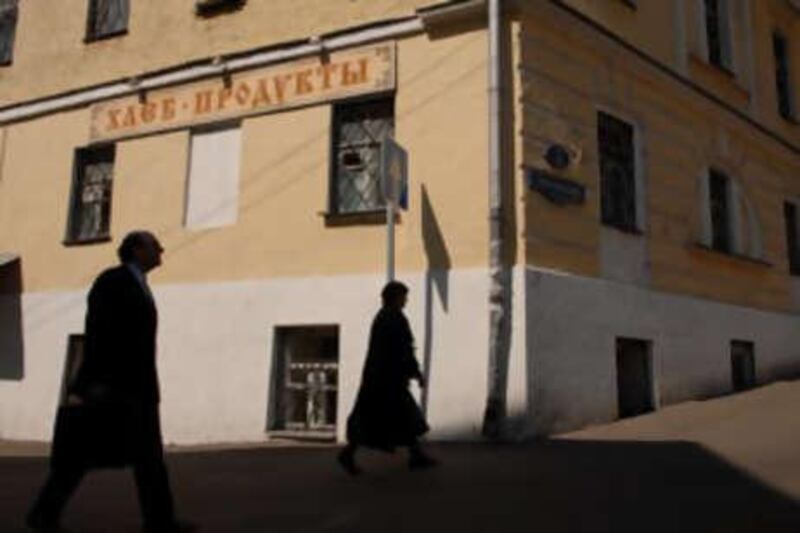MOSCOW // Sonya Arendt's new flat sounds like a dream: seven charming rooms in an ornate 19th century building in the centre of Moscow, where residential real estate prices have soared more than 100 per cent over the past three years.
There is a catch, however, for Ms Arendt, a 27-year-old actress and native Muscovite. When the deal goes through, she will own just a 12 square metre room and have to share the kitchen, toilet and bathroom with three other families in a notorious institution left over from Soviet times: the communal flat. "I didn't really have any other choice," Ms Arendt said. "The prices in Moscow are so high that all I could afford was a room in a communal flat. Of course I would buy a flat if I had more money."
Communal flats, or kommunalki, were introduced on a mass scale after the 1917 revolution, when the Bolsheviks confiscated large flats from wealthy families and crammed them with proletarian families, typically one to a room. The petty squabbles and lack of privacy arising from so many people living so close together made the communal flat the antithesis of a solution to the eternal kvartirny vopros, or "question of living space", which continues to plague millions of Russians and residents of other former Soviet-bloc countries who are living in dilapidated and crowded apartments.
Although Russian authorities have undertaken measures to eradicate communal flats - usually by selling them off to wealthy buyers and moving the residents in to apartments in the suburbs - hundreds of thousands of Russians continue to live in these collectives. There are more than 90,000 communal flats in Moscow, about 2.5 per cent of all flats in the city, said Nikolai Fedoseyev, deputy head of Moscow City Hall's residential policy department.
Residents of 3,000 communal flats were resettled last year, Mr Fedoseyev said. Persuading residents to move out of their rooms in communal flats is not always easy, said Maxim Mokeyev, executive director of Evans Property Services in Moscow. The price per square metre for a room in a Moscow communal flat is higher than in a single flat, and the owners of the rooms hold out for the best possible deal, Mr Mokeyev said.
Such cases as Ms Arendt's are the exception rather than the rule, Mr Mokeyev said. "A lot of young people come to Moscow thinking they will buy a room in a communal apartment, but then get scared off by things like alcoholic neighbours," Mr Mokeyev said. The undisputed king of kommunalki in Russia is St Petersburg, which is home to 113,000 communal flats, said Yunis Lukmanov, head of the city's housing committee. St Petersburg has earmarked about 5.5 billion roubles (Dh860 million) next year for a programme to liquidate communal flats in the city and resettle their residents, Mr Lukmanov said.
A majority of the communal flats in St Petersburg are located in the city centre, where between 10 per cent and 15 per cent of all apartments are kommunalki, said Ilya Utekhin, dean of the ethnology department at the European University at St Petersburg. Mr Utekhin, 40, lived in a communal flat in Russia's northern capital for 30 years, and life in kommunalki was the subject of his doctoral dissertation.
Lack of privacy and a general disregard for the upkeep of collective areas - such as the bathroom, toilet, hallway and kitchen - are hallmarks of life in a communal flat, Mr Utekhin said. "This extended to Soviet life in general," Mr Utekhin said. Indeed, many of the problems of life in a Soviet communal flat - jealousy, pilfering, drunkenness - remain prevalent in the kommunalki of modern Russia.
Featured on a multimedia website devoted to kommunalki put together by Mr Utekhin (http://kommunalka.colgate.edu) is a letter from one resident to the Austrian consulate in St Petersburg. The writer advises that a young female cohabitant not be issued a visa, then lists an inventory of everyday sins that could have been lifted straight from a Soviet-era denunciation - though the letter appears to have been written in 2003.
"For quite some time now [she] has not had regular employment, she has unfulfilled financial obligations towards me, continually interferes with normal life in the communal apartment, creating disturbances after 11 o'clock at night by returning home in a state of intoxication and accompanied by strangers, and she has made threats against me," the letter reads. She "engages in promiscuous sexual relations with foreign nationals whom she then uses as a source of financial support".
The website - which concedes that it cannot confirm the veracity of the copy of the letter it has republished - notes that the "lack of any specific reference to Austria suggests that similar letters may have been sent to other consulates in St Petersburg". Crimes involving communal flat residents are also common. In 2005, a Moscow court sentenced a resident of a communal flat to one year of community service for stealing 4.5kg of pork chops - estimated value, US$50 (Dh183) - from a refrigerator in a communal kitchen.
The young couple that owned the pork had placed a hidden camera in the kitchen and caught the thief red-handed. The matriarch of the flat into which Ms Arendt is moving is a woman in her eighties who has lived in the apartment for 50 years. It is situated on the second floor of a four-storey building finished in 1898. Among the other residents is a cleaning lady in the Moscow city legislature who has a habit of loudly expressing her displeasure with the failures of her cohabitants, Ms Arendt said.
"Everyone is so clean and careful and tidy that I'm worried I won't fit in," Ms Arendt said. "People walk around asking who left the light on. I'm an actress, and I lead a nocturnal life and always have lots of friends coming around. I'm certain there will be some problems." @Email:cschreck@thenational.ae






